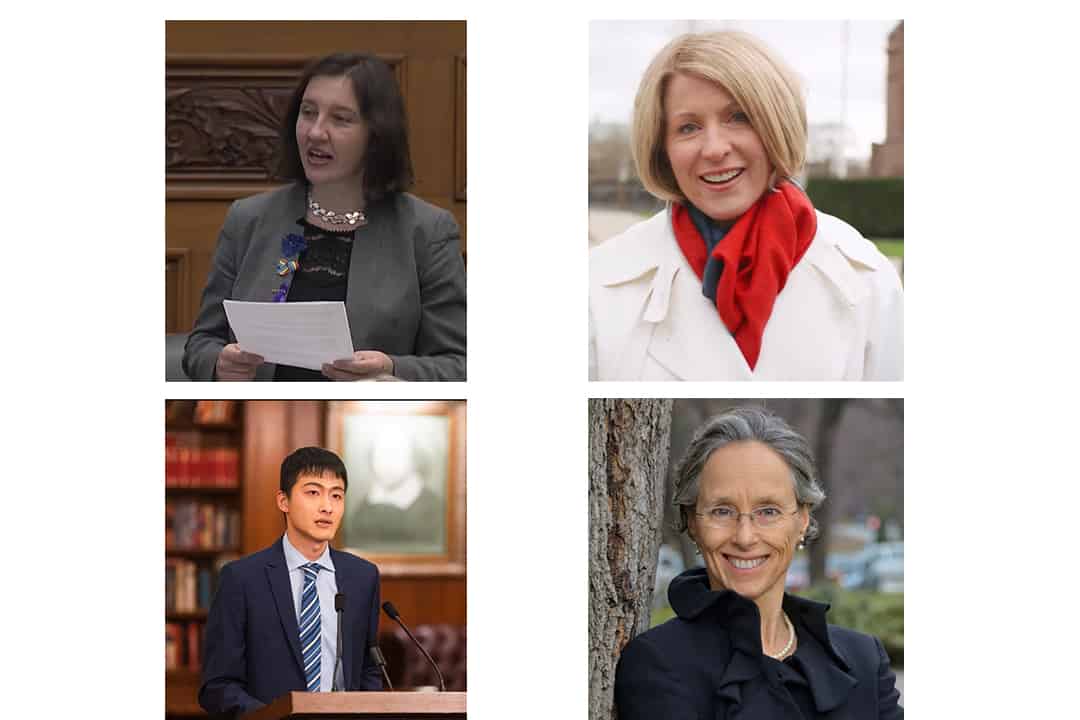As the provincial election on June 2 approaches, The Varsity profiled four of the candidates running for the MPP seat in University—Rosedale, the electoral district of UTSG.
Students who meet the voting eligibility requirements can register to vote through Elections Ontario.
Jessica Bell, Ontario New Democratic Party MPP candidate
Jessica Bell is the Ontario New Democratic Party (NDP) MPP candidate running for reelection in the University—Rosedale riding.
Prior to joining the NDP, Bell’s background in community organizing led her to serve as the founding executive director of TTCriders — a transit advocacy organization — and the director of the California Food and Justice Coalition — a California-based organization working to establish sustainability in food access.
One of Bell’s campaign priorities is housing affordability. During her term, Bell introduced legislation to clamp down on property speculation — the buying of real estate to resell it for a profit — through a vacant homes tax, pushing for transparency in the housing sector.
Bell noted in an interview with The Varsity that “tuition should never be a barrier to education.” She wants additional funding for universities, affirming that “an NDP government will properly fund universities so that they don’t have to rely on constantly increasing tuition fees.”
In light of the Ford government’s domestic tuition freeze, universities in Ontario have sought to offset the decreasing domestic tuition revenue by increasing international tuition. Non-Ontario domestic students have also witnessed increasing tuition, with an expected increase of three per cent at U of T for the 2022–2023 academic year. International students are not eligible to vote in Ontario’s provincial elections.
Bell also pledged that NDP leadership will convert the Ontario Student Assistance Program from a system of loans to one of grants to rid students of debt and retroactively eliminate student loan interest.
On the matter of mental health, Bell said, “It is our position that mental health [care] is health care.” She added that the NDP will strive toward a universal health-care system — which would include pharmacare, universal dental care, and increased funds for mental health services. She explained that, through a universal health-care system, “people can get the health care that they need using their [Ontario Health Insurance Plan (OHIP)] card instead of their credit card.”
Andrea Barrack, Ontario Liberal Party MPP candidate
Andrea Barrack is the Ontario Liberal Party candidate running for the MPP seat representing the University—Rosedale riding.
Barrack served as head of a community health centre, which worked to improve access to health and other community services. She was also previously the CEO of the Ontario Trillium Foundation, a government-funded organization that grants money to non-profit community projects.
Barrack has worked in various capacities in community organizing. She has been involved with Planned Parenthood and worked with immigrants and first-generation university students to ensure that they have access to the resources they need.
Barrack, who became pregnant with her son at the age of 16, is committed to expanding the public services she relied on as an adolescent mother.
Her policy priorities include introducing a regional living wage starting at $16 an hour; building more affordable housing; implementing rent controls; increasing funding for schools; cutting transit fares to one dollar; and raising disability, elder, and social assistance benefits.
Carl Qiu, Progressive Conservative Party of Ontario MPP candidate
Carl Qiu is running as the Progressive Conservative (PC) Party of Ontario candidate for MPP in the University—Rosedale riding.
Qiu immigrated to Canada at the age of two and has lived in Toronto since. He obtained an undergraduate degree from U of T and a Master of Business Administration from York University.
Previously, Qiu was a PC Party executive responsible for the coordination of youth outreach.
Qiu’s platform focuses on bolstering the economy and keeping living costs down. His priorities include supporting small businesses, investing in the life sciences and technologies, encouraging pursuit of jobs in the skilled trades, and lowering taxes on gas.
In his current work, at a global venture capital firm, Qiu researches pathways of improving and modernizing the Canadian economy.
If elected, through his background in finance and business, Qiu is committed to upholding fiscal responsibility.
Dianne Saxe, Green Party of Ontario MPP candidate
Dianne Saxe is the Green Party of Ontario MPP candidate for the University—Rosedale riding, and she is currently the deputy leader of the party.
Saxe is a renowned environmental and energy lawyer. “I have been fighting for the public interest for 46 years,” she said in an interview with The Varsity.
Saxe served as the Environmental Commissioner of Ontario from 2015–2019. She is running for MPP because she wants to seriously address the climate crisis and ensure a good future for generations to come.
She is committed to building a clean energy economy, which she said would reduce the cost of living. “Renewable energy is inherently deflationary: the more we use, the less expensive it gets,” she explained.
Saxe is also committed to extending OHIP to cover most mental health services while paying particular attention to youth mental wellness. Currently, OHIP covers treatment from psychiatrists, family doctors, and nurse practitioners, as well as psychologists and social workers at hospitals. It does not cover visits to private psychotherapists or counsellors.
On student debt, Saxe said that the Ford government’s decrease of funds to public higher education has forced universities into an “untenable position.” This has resulted in a higher cost of education that has increasingly burdened students. She also recognizes that Canada’s dependence on fossil fuels drives up the costs of living and, therefore, makes student debt difficult to pay off.
“Action feels a lot better than anxiety,” she said. “If [voters] want to feel better about [the] climate [crisis], the single best thing they can do is stand up and get involved in this election and fight for a climate leader like me.”


